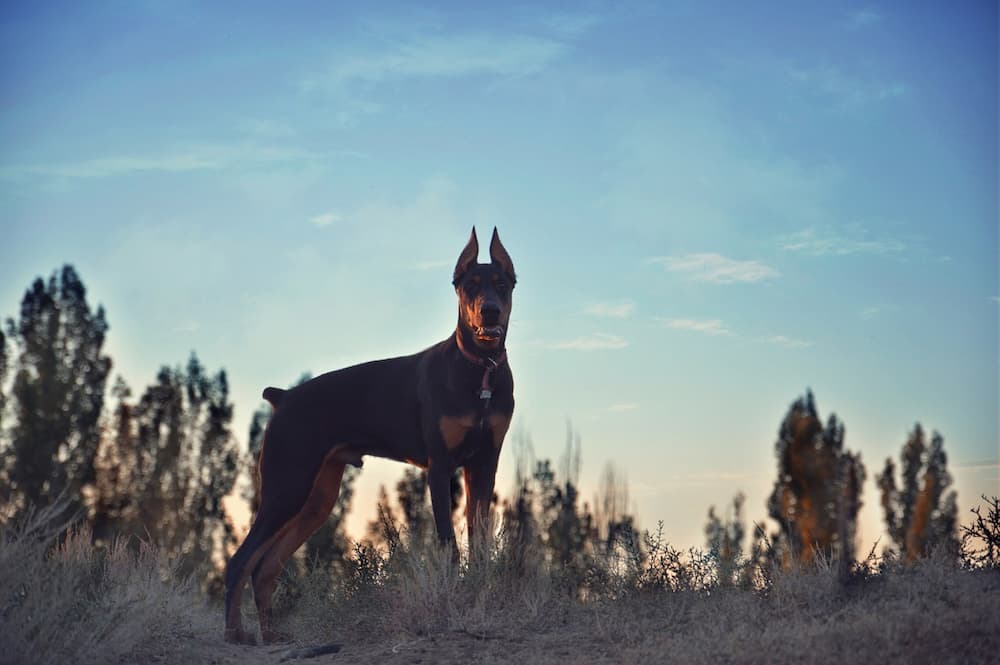It’s just another day, your lounging next to your Doberman while watching tv and you turn to pet them, but instead of getting a welcome response, your Doberman growls at you.
Maybe you’ve just brought home your new Doberman and you’re all excited to introduce them to all the new toys they have. You throw the toys around and your Doberman finds one it really likes and begins to chew on it. But then as you approach to take it and they duck their head, looking you in the eye while growling.
Growling Doesn’t Mean Your Doberman Is Aggressive
It has always been normal for growling to be thrown in with the aggressive dog category a bit too freely. Many dog owners overreact when their dog growls as they feel as if their dog is disrespecting them, or they believe they can’t trust their dog in the future because they now believe them to be aggressive. However, just because a dog growl doesn’t necessarily make them aggressive.
Before continuing, it’s important to mention that growling can also come up while the dog is playing, especially if a game like tugging is happening. The growling heard in these situations, playing tug of war or growling when playing with another dog, is non-threatening; it simply means that your Doberman is getting really into the activity. You should take in what the context of what their body language is saying to decipher what they’re trying to communicate to you.
Generally, a Doberman that’s growling is their way of warning you that you’re either making them uncomfortable or are breaking a personal boundary they might have. In other cases, this behaviour can be used to intimidate you or another dog. In a case like this, your Doberman’s body language will be forward moving in a slow manner or they may come in very close and try to “tower” over you while growling in order to intimidate you.
In the world of dogs, if you decide to bypass the growl and the dog is serious enough or feels as though you’re overstepping a clear boundary, then it could be followed by a bite, and that is valid in their eyes. Would this make your Doberman aggressive? It still doesn’t mean that your Doberman is “aggressive,” as there was clear communication stating that you should stop whatever it is that you’re doing. In the previous situation, if you had stopped then, the Doberman wouldn’t have felt the need to bite. A dog that’s truly aggressive gives very little to no warning and won’t hesitate to just go in for the bite, and would resort to that form of response consistently.
What Should You Do When Your Doberman Growls At You?
The first thing is to not freak out. Panicking and having a big reaction to a situation like this could possibly pull out a bigger response from the Doberman, such as snapping.
1. Stop Moving
What you want to do is freeze for a moment and later withdraw. By freezing and stopping what you’re doing allows the brain a second to de-escalate from the trigger. Moving or reacting too quickly or too soon, the motion may cause the Doberman to go into prey drive. They would do this before even thinking.
For example, if you reach down to pet your Doberman and they begin growling as you reach over, don’t immediately retract your hand and jump back. Doing this will probably get the Doberman to snap at you because it sees that you are afraid. Instead, try holding your hand there for a second, then slowly bring your body into an upright position while bringing your hand back to your side. Refrain from pulling your hand back up towards your chest area, as doing this would be retracting. Simply, bring it slowly to its resting place by your side.
You can see the difference between doing this by doing it in the mirror. You’ll be able to see a clear difference between the two responses. You’ll see one that says, “I’m afraid,” while the other says, “I’ve heard your warning and I am backing off respectfully.” Of course, knowing how to withdraw without showing fear takes confidence, but by withdrawing correctly – even when you don’t feel confident – will still be effective.
2. Back Away From the Doberman
Once you’re out of the dog’s immediate space, you should back away in a slow, but not too slow that you look like you’re scared of the situation. Keep the front of your body facing your Doberman until you see that they’ve broken the tension. This includes with the Doberman breaking eye contact, or a shift in body language that’s away from you, going back to whatever, it was that they were doing, or becoming disinterested. Once you’ve seen that they’re no longer in conflict with you, you can then turn and walk away from the situation.
3. Don’t Interact With The Doberman
When you’re in a tense situation with your Doberman, don’t try to talk to the Doberman when all of this is going on. For example, you shouldn’t hold your hands up in front of you to show non-threatening body language or try communicating to them by saying “that’s a good boy/girl.” The reason to not do this is to show your Doberman that you’re not a threat because we don’t want them to think that they can continue to intimate by pursuing you even when the front of your body is facing them. You’ll want to back off confidently so that your Doberman perceives a withdrawing threat that will act if provoked. Always keep in mind that forward body language is confrontational, and that’s what is keeping them from pursuing you.
Another reason to avoid talking to them as you walk away is that it simply keeps their brain in a state of agitation. So, even though you’ve left their personal space, your words are still keeping them stuck in the moment rather than allowing them to relax and let go of the tension. Just maintain eye contact, back off with your hands at your side, and turn once you see that the tension has been broken with your Doberman.
If at any point your Doberman does go in pursuit, make sure to keep your forward body language the same as before, and pivot to face them if they try to get around you. When you’re showing the front of your body, this should keep most dogs going any further, and if they do come too close to you, then slightly move towards them to get them to flush back. In a situation like this, you may find yourself taking a few steps forward for every few steps back you take in order to keep the dog at a distance until you can remove yourself from the situation safely.
Your Doberman May Have A Reason For Growling At You
Dogs have always been considered as being very honest animals and will have no problem telling you if you’re crossing a boundary. Don’t think that just because your Doberman has never growled at you in the 5 years, that they never will. Just like with humans, your Doberman’s personality will constantly change all the time in response to what’s going on in its life.
Hopefully, this information will benefit you and your Doberman. If it’s your own Doberman, that’s growling at you, then don’t avoid the situation and don’t hesitate to call a professional to help you address the behavior so that it doesn’t continue to happen or escalate to an even more intense level.








